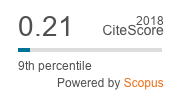Questionário Estendido de Atributos Pessoais:
Uma Medida de Traços Masculinos e Femininos
Mots-clés :
Masculinidade e feminilidade, Identidade de gênero, Traços expressivos e instrumentaisRésumé
RESUMO - O presente trabalho teve como objetivo adaptar, para o meio cultural brasileiro, o Questionário Estendido de Atributos Pessoais (EPAQ), de autoria de Spence, Helmreich e Holahan (1979), que consiste em uma medida de traços masculinos (instrumentais) e femininos (expressivos) socialmente desejáveis e indesejáveis. O instrumento foi aplicado a 800 estudantes universitários de ambos os sexos. Os resultados das análises fatoriais e das médias das auto-avaliações revelaram a necessidade de algumas modificações na versão original do instrumento. Os índices de consistência interna das escalas foram, em geral, fracos. Ainda assim, os dados da amostra brasileira replicaram os da norte-americana, ao sustentar o modelo teórico bifatorial de traços de personalidade masculinos e femininos proposto por Spence e Helmreich (1978). Concluiu-se que o EPAQ, em sua versão brasileira, apesar de apresentar algumas deficiências psicométricas, mostrou-se um instrumento promissor. A realização de estudos futuros para o refinamento de suas qualidades psicométricas foi sugerida.
Téléchargements
Références
Journal of Consulting and Clinicai Psychology, 42, 155-162.
Berzins, J.I., Welling, M.A. & Wetter, R.E. (1978). A ncw measure
of psychological androgyny based on the Personality Research
Form. Journal of Consulting and Clinicai Psychology, 46,
126-138.
Block, J.H. (1973). Conceptions of sex roles: Some cross-cultural
and longitudinal perspectives. American Psychologist, 28,512-
527.
Carlson, R. (1971). Sex differences in ego functioning. Journal of
Consulting and Clinicai Psychology, 37, 267-277'.
Díaz-Loving, R., Díaz-Guerrero, R., Helmreich, R.L. & Spence, J.
T. (1981). Comparación transcultural y análisis psicométrico
de uma medida de rasgos masculinos (instrumentales) y femeninos
(expresivos). Revista de laAssociaciónLatinoamericana
de Psicologia Social, 1, 3-37.
Heilbrun, A.B., Jr. (1976). Measurement of masculine and feminine
sex-role identities as independent dimensions. Journal of Consulting
and Clinicai Psychology, 44, 183-190.
Helmreich, R.L., Spence, J.T. & Wilhelm, J.A. (1981). A psychometric
analysis of the Personal Attributes Questionnaire.
Sex Roles, 7, 1097-1108.
La Rosa, J. (1979). Estereótipos do papel sexual. Psico, 15, 55-71.
Rosenkrantz, P.S., Vogel, S.R., Bee, H., Broverman, I.K. & Broverman,
D.M. (1968). Sex roles stereotypes and self-concepts
in college students. Journal of Consulting an Clinicai Psychology,
32, 287-295.
Runge, T.E., Frey, D., Gollwitzer, P.M., Helmreich, R.L. & Spence,
J.T. (1981). Masculine (instrumental) and feminine (expressive)
traits: A comparison between students in the United States
and West Germany. Journal of Cross-Cultural Psychology, 12,
142-162.
Silva, T.R.N., Guarido, E.L. & Graciano, M. (1976). Estudo sobre
estereótipos sexuais nas percepções dos pais em relação a
comportamentos e atitudes de seus filhos. Cadernos de Pesquisa,
18, 15-19.
Spence, J.T. (1984). Masculinity, femininity, and gender-related
traits: A conceptual analysis and critique of current research.
Em B.A. Maher e W.B. Maher (Orgs.), Progress in experimental
personality research (Vol. 13, pp. 1-97). New York: Academic
Press.
Spence, J.T., Deaux, K. & Helmreich, R.L. (1985). Sex roles in
contemporary American society. Em G. Lindzey & E. Aronson
(Orgs.), Handbook of social psychology (3a ed., Vol. 2, pp.
149-178). Reading, Mass.: Addison- Wesley.
Spence, J.T. & Helmreich, R.L. (1978). Masculinity and femininity:
Their psychological dimensions, correlates and antecedents.
Austin, Texas: Univ. of Texas Press.
Spence, J.T., Helmreich, R.L. & Holahan, C.K. (1979). Negative
and positive components of psychological masculinity and
femininity and their relationships to self-reports of neurotic and
acting out behaviors. Journal of Personality and Social Psychology,
37, 1673-1682.
Spence, J.T., Helmreich, R. & Stapp, J. (1975). Ratings of self and
peers on sex role attributes and their relation to self-esteem and
conceptions of masculinity and femininity. Journal of Personality
and Social Psychology, 32, 29-39.



